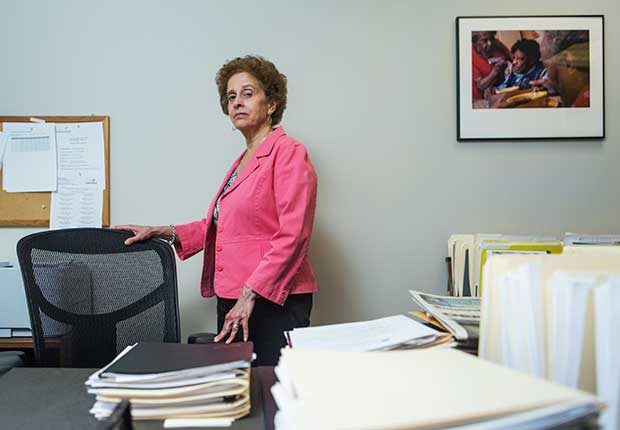AARP Hearing Center

By Tamara Lytle
Rebecca Pritchett, of Roanoke, didn’t build a nest egg while raising 13 kids and working jobs in construction and hotels. So when it comes to paying medical expenses not covered by Medicare, she relies on Medicaid.
“It’s been a blessing to me that I have Medicaid,” said Pritchett. Without it, she wouldn’t be able to afford all the health care she needs. The program also covered medication and doctor visits for her granddaughter while the child lived with her for six years.
Medicaid, which pays for health coverage for the disabled, low-income families and many nursing home residents, turns 50 in July. It’s had a major impact on millions of Virginians and is the largest source of health coverage in the country.
In Virginia, nearly 1.2 million residents are Medicaid beneficiaries. As in other states, long-term care eats up much of the budget—34 percent of the spending in Virginia, according to the nonpartisan Kaiser Family Foundation.
David DeBiasi, director of advocacy for AARP Virginia, calls Medicaid the “pillar of our long-term services and support” because few people have long-term care insurance or can afford the $93,000-a-year median cost in Virginia of nursing care in a private room.
Many adults excluded
Although the federal government and Virginia evenly split the cost of Medicaid, many details—such as who’s eligible—are left to the state. Virginia is one of the most stringent in the nation in offering coverage.
Jill Hanken, an attorney at the nonprofit Virginia Poverty Law Center, said that although the state has expanded the program, many low-income adults are left out.
“Virginia can and should do much more for people who need health care services,” Hanken said. For example, adults without dependent children are left out of the program unless they are 65 or older, disabled or pregnant.
Most working parents qualify only if their income is well below the federal poverty level of $11,770 for an individual, making Virginia the 44th “stingiest” state, DeBiasi said. The state ranks 49th in how much it spends per capita on Medicaid because of the strict eligibility rules and lower reimbursement rates for providers, according to the Virginia Hospital & Healthcare Association.
The Affordable Care Act, sometimes called Obamacare, opened Medicaid to many more working adults, but Virginia is one of 21 states that have rejected the option. Although Gov. Terry McAuliffe (D) pushed for the expansion, the General Assembly voted the idea down amid concerns about the cost.
The federal government currently covers all the costs of the expanded coverage; its share will decline to 90 percent by 2020.
If the state had approved expansion, adults earning up to about $16,240—an estimated 400,000 people—could have signed up.
“The governor believes that Medicaid expansion will remain a relevant issue,” said Bill Hazel, secretary of health and human resources. “Expansion of Medicaid will become a reality because it will ensure that we have the strong and healthy workforce necessary to build a new Virginia economy.”
DeBiasi said 62,000 people who would become eligible are between 50 and 64. Many of them lost jobs and don’t have health coverage.
Despite the decision not to expand Medicaid, the state has obtained federal waivers to offer services to people who may need long-term care.
One program uses Medicaid dollars to provide assistance through community settings such as adult day care. “It allows people to stay home, which is usually what people want,” Hanken said. “And it saves money” because community care often costs less than other facilities.
Another new program, Commonwealth Coordinated Care, offers managed care to people like Pritchett who are eligible for both Medicaid and Medicare.
Virginia’s Medicaid program has moved toward more coordinated and managed care since the 1990s, said Chris Bailey, executive vice president of the Virginia Hospital & Healthcare Association. That means closer communication between caregivers to improve outcomes, avoid duplicative tests and keep costs under control.
“The program is at a very pivotal moment,” Bailey said. “The most important changes in 50 years are happening now.”
Tamara Lytle is a writer living in Falls Church.































































